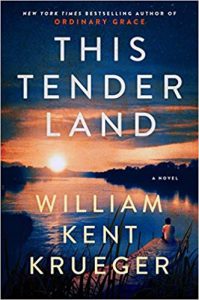 While this wonderful novel bears all the hallmarks of William Kent Krueger, it’s not exactly a mystery. There are some mysterious – or criminal – elements and the fact that it’s not a straight up mystery should keep no reader away. Written as a companion to Krueger’s classic, Ordinary Grace, it is a spiritual companion but it’s not a sequel or a prequel or anything like it. It’s very much its own country.
While this wonderful novel bears all the hallmarks of William Kent Krueger, it’s not exactly a mystery. There are some mysterious – or criminal – elements and the fact that it’s not a straight up mystery should keep no reader away. Written as a companion to Krueger’s classic, Ordinary Grace, it is a spiritual companion but it’s not a sequel or a prequel or anything like it. It’s very much its own country.
Set in 1930’s Minnesota, it’s the story of Odie, his brother Albert, and their friend Mose, who doesn’t speak. All of them are young and living in an “Indian” boarding school. At the time (and up through the early 70’s) native children were taken from their homes and put in these harsh schools where they were allowed little to no contact with their families and were forbidden – even punished – if they spoke their native language. They were given western style haircuts and forced to anglicize their names.
While Kruger doesn’t go into all these details it’s clear the Lincoln school, where Odie and his brother are students, is especially harsh, and the impulsive, outspoken Odie is often punished in the “quiet room” (a.k.a. prison cell) where he’s forced to spend many nights on his own. Odie and Albert are white orphans, the only white children in the school, but the shared burden of living under the wrath of the Brinkmans, who run the school, makes them all brothers.
The story is epic in scale. The brothers – and Mose – are on the cusp of adulthood, being between 12 and 15 – and the adventures that come their way in this novel, which takes place at the height of the depression – are adult ones. When they tell folks they encounter on their journey they are on their own and are orphans, it’s accepted with a shrug.
The story begins with Odie in the quiet room, and goes on to explicate the brother’s relationship – never easy – and their friendship with Mose. When a natural disaster and some more man made ones occur, they take to the river in their canoe along with Emmy, the child of a former teacher. The four are intrepid and live under the stars, catching fish, scrounging food and clothes, and living on the lam because of events tied to the Lincoln school.
The river is full of twists and turns and takes the boys and Emmy through some of the iconic settings of the 30’s – a religious revival tent, Hoovervilles, riding the rails, and to a farm where they work by day and where they are locked up by night.
The story takes its own sinuous and compelling path, with the boy’s quest for identity and a home at the forefront of all their minds. Like all great quest stories from The Wizard of Oz to Huckleberry Finn (which is really the ancestor of this novel) the turns and surprises are many. And the journey takes them further on their quest in very unexpected ways.
The spirit of this novel – the threads of love and kinship that bind this little troupe to one another and to the earth (or “This Tender Land”) – is a compelling and moving one. I suppose if you don’t buy into it you won’t enjoy it, but I urge you to give in. Toward the end of the book is this quote: We breathe love in and we breathe love out. It’s the essence of our existence, the very air of our souls. When Odie fights against this thought, he’s adrift. When he doesn’t, he’s not. Sounds simple, but this complex, beautiful novel is far from simple. I urge you to take a leap and enjoy the journey the brilliant Krueger has provided.